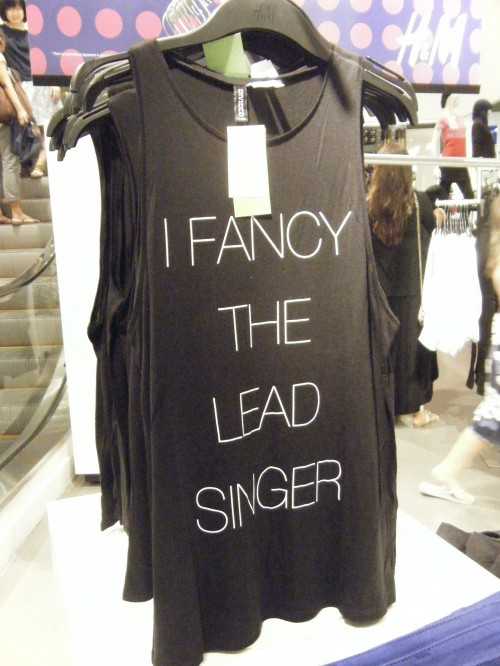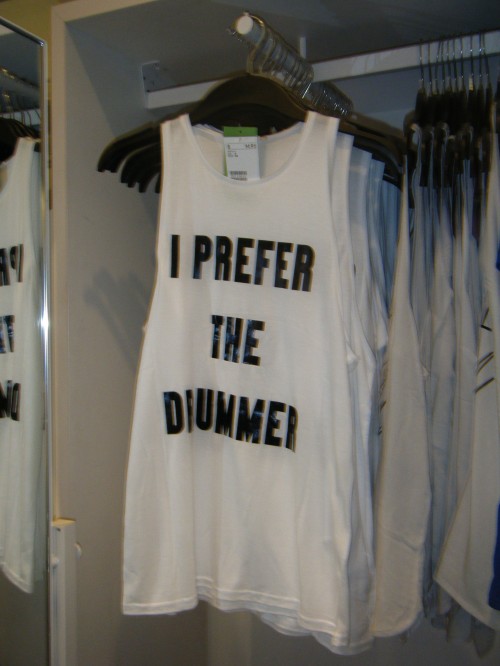For the last week of December, we’re re-posting some of our favorite posts from 2012.
In “Rock in a Hard Place: Grassroots Cultural Production in the Post-Elvis Era,” William Bielby discusses the emergence of the amateur teen rock band. The experience of teens getting together with their friends to form a band and practice in their parents’ garage is iconic in our culture now; recalling their first band or their first live show is a standard element of interviews with successful rock musicians. Bielby traces the history of this cultural form, which appeared in the 1950s. In particular, he argues that social structures largely excluded young women from full participation in the teen band phenomenon.
Though young women were involved in many other types of musical performance, the pop charts featured many successful female artists in the 1950s, and girls listened to music more than boys, rock bands emerged as a male-dominated (and predominantly White) musical form. One important reason was parents’ concern about the rock subculture and the lack of supervision. Parents might be willing to let their sons get together with friends and play loud music and travel around town or even to other cities to play in front of a crowd, but they were much less likely to let their daughters do so. Gendered parenting, and the closer regulation of girls than boys, meant that girls were less likely to be given the chance to join a band. So while boys were learning to take on the role of active producers of rock music, girls didn’t have the same opportunities.
Yunnan C. sent us photos she took of two shirts at an H&M store in Toronto that made me think about Bielby’s argument:
As Yunnan points out,
This, as fashion, enforces this idea that being in a band and playing music are for guys, limiting women to being the passive consumers and supporters of it, rather than the producers.
The shirts don’t just cast women in the role of fans; they specifically frame them as potential groupies, whose fandom is filtered through a romantic/sexual attraction to individual members of a band. Communications scholar Melissa Click argues that female fans are often dismissed because there is a “persistent cultural assumption that male-targeted texts are authentic and interesting, while female-targeted texts are schlocky and mindless—and further that men and boys are active users of media while girls are passive consumers.” While the image of the groupie is as well-known as that of the band, the groupie is usually viewed skeptically, seen as someone with a superficial, inauthentic appreciation of the music, “a particular kind of female fan assumed to be more interested in sex with rock stars than in their music.”
So the H&M shirts reflect gendered notions about who makes music (there were no shirts saying “I am the drummer”) as well as the idea that women’s appreciation for music and other forms of pop culture should be expressed through affection for a specific person, a form of fanhood that ultimately stigmatizes those who express it as superficial and inauthentic.
Gwen Sharp is an associate professor of sociology at Nevada State College. You can follow her on Twitter at @gwensharpnv.


Comments 47
ViktorNN — July 26, 2012
Those shirts read as fairly obviously ironic to me.
Perhaps the rush to take offense here is coming at the expense of recognizing the intelligence of the girls who are going to buy these shirts?
captain pasty — July 26, 2012
I seriously want one of these. If I can find one that says "I fancy the bassist" (which is unlikely), then I'd buy it, and wear it on stage, when I'm playing in my band. I play the bass. Wouldn't that be brilliant?
Andrew — July 27, 2012
" male-targeted texts are authentic and interesting, while female-targeted texts are schlocky and mindless—and further that men and boys are active users of media while girls are passive consumers "
Whoever wrote this has never been in a T-shirt shop before! It's actually worse. As far as the male-targeted stuff goes, take away the boorish sex(ist) innuendo and the endless jokes about beer, and most of what's left is a bunch of logos and trademarked images. Unless sporting a band's logo across your shirt makes you an "active user of media," or a bad joke about boobs is "aunthentic and interesting," I'd say all genders are being treated by most mass-producers of cheap merchandise as passive consumers.
But I think anyone who has been to a big-name pop or rock concert in the last 30 years or so will have noticed a prevalence of homemade fan t-shirts, with cutesy messages about/to certain musicians handwritten across the front, and so forth. These shirts are referencing that ironically, showing how absurd it would be to appropriate this kind of shirt as a generic consumer product. I see them actually as a kind of tongue-in-cheek parody of consumerism, one which is even funnier when inevitably worn somewhere other than a concert.
Marleester — July 27, 2012
And what if the wearer is a lesbian?
Anna — July 27, 2012
"While the image of the groupie is as well-known as that of the band, the groupie is usually viewed skeptically, seen as someone with a superficial, inauthentic appreciation of the music, “a particular kind of female fan assumed to be more interested in sex with rock stars than in their music.”
I don't think this is accurate, although I have no way of providing evidence for it. I think groupies are viewed as having contributed a lot to rock'n'roll history. Groupies acted as muses for many musicians, and they were often the glue that sustained a musical social scene; the most readily available evidence of this is that many classic songs, albums, and tours were inspired and/or nurtured by them. I am not refuting that they were often viewed and treated as disposable sex objects, but their musical, visual, and subcultural contributions are also significant.
Jane — July 28, 2012
Does this mean I can't fancy a female drummer?
Kat — July 29, 2012
The comment section of EVERY SINGLE post about feminism, sexism or racism ever on this site: "No, you're reading it wrong. It is [insert satire/irony/other bullshit here]."
Ashes — July 30, 2012
Interestingly enough, I first saw the 'I prefer the drummer' shirt on a guy a few days ago. Granted, he was a drummer himself, and I found it pretty funny, but I hadn't realised it was supposed to be a girls' product until this article. A step in the right direction?
Guest Avenger — October 28, 2012
okay here is the deal i like these shirts , i think there awesome and to be honest a person has a choice the wear whatever they want saying that someone isn't a fan of the music just because their wearing a shirt saying "i fancy the lead singer" is a little harsh , just because there wearing that shirt doesn't mean they don't love the band as much as someone who isn't. WHAT YOU ARE WEARING DOES NOT AFFECT HOW YOU PERCEIVE THE MUSIC
Another thing i hate is when people assume their better than someone just because of the clothes their wearing. Just because their wearing a shirt like that doesn't mean there willing to sleep around or have sex with every band member on the planet and to be honest i find it degrading that people assume that.As for the matter of saying that its sexist because it's only aimed at women that doesn't mean guys aren't allowed to wear that shirt there is nothing stopping a guy from going and buying this shirt.
So there's my opinion and judging from the other comments this might get some hate but you should never think you're better than someone just because their wearing something you wouldn't.
Laura Lee — December 29, 2012
The shirts look unisex to me. I wouldn't know they were intended for women except that it says so.
What interests me more about the rock star dynamic is that it seems to be one area in which women are allowed to objectify men. The male rock stars often revel in their objectification. Normally when men are praised for physical beauty it is seen as threatening to their masculinity. So it is interesting that when women do respond to men as sex objects (which one do you think is the most bangable?) they are being described as passive. In normal circumstances, when men are permitted to gaze on women and objectify them the man is seen as powerful and the woman as passive.
Rob Wilson — December 30, 2012
Check out STONEFIELD this amazing all girl blues/rock band 4
sisters from rural Australia youngest 14-
played the John Peel stage at Glastonbury in 2011 and back for 2013- won the
Triple JJJ award in Sydney.
Headline figures? Women at Reading Festival | Numbers Down the Wire — March 24, 2013
[...] one of the most interesting I’ve seen comes from sociologist William Bielby (summarized at thesocietypages.org, with supporting evidence from the shop floor at H & [...]
Quickies: 04/01/2013 | Queereka — April 29, 2013
[...] Bands, fans and gender: an essay. [...]
Toquecelular — March 4, 2023
Existem vários sites e serviços online que oferecem toques gratuitos. No entanto, por royalties, royalties e outros motivos, alguns serviços cobram dos usuários o download e o uso de seus toques. https://toquecelular.com/som-do-alarme-iphone Um exemplo de site que possui centenas de toques MP3, WAV e MIDI gratuitos é o toquecelular e alguns outros sites de música.
Como transferir toques do computador para o celular?
Normalmente, alguns sites podem enviar um toque para você ligando para um número e inserindo um código. No entanto, esse processo geralmente custa dinheiro extra, além da transmissão de dados. Você também pode baixar toques de um site e conectar seu telefone ao computador usando um cabo USB ou Bluetooth. Depois de baixar o coole klingeltöne, você pode copiar músicas do computador para o telefone. Por exemplo, telefones conectados no Microsoft Windows são listados em Meu computador.
Dabria Jelena — June 27, 2023
The dresses and skirts featuring ruffles created by some of theworld's most important fashion designers pose as a great source ofinspiration for you so check out the designs shown by Azzaro, Air Jordan Shoes AnnaSui, Badgley Mischka, Yves Saint Laurent, Collette Dinnigan,Valentino and many more others.
ToqueDeCelular — December 5, 2023
Aquelas camisetas "Mr. Guitar Guy" promovem a noção ultrapassada de que tocar em uma banda é apenas para homens e que as meninas deveriam apenas torcer por eles. A produção musical deve dar direitos iguais a todos os géneros. E se você quiser ouvir músicas da sua banda favorita para definir como toque? Você pode dar uma olhada neste site https://toquedecelular.com/. Pode haver muitas músicas de sucesso para você definir como toque.
John Arthur — April 22, 2024
The dynamic between bands, their fans, and gender has long been a fascinating topic in the realm of music culture. One notable aspect is the allure of the lead singer, which often transcends mere musical admiration and delves into realms of personal attraction and idolization. This phenomenon sheds light on broader themes of identity, power dynamics, and the intersection of music and gender. Look no further than https://chakushinon123.com – your one-stop destination for premium, customizable ringtones!
Spicekitkat — April 22, 2024
Ultimately, the allure of the lead singer reflects the complex interplay of music, identity, and culture, with gender playing a significant but often overlooked role. By examining the dynamics between bands, their fans, and gender, we gain insight into larger societal attitudes and power dynamics, as well as the transformative potential of music to challenge norms and inspire change. Look no further than 着信音 – your one-stop destination for premium, customizable ringtones!